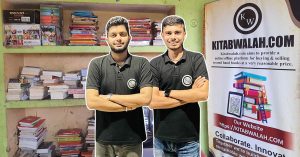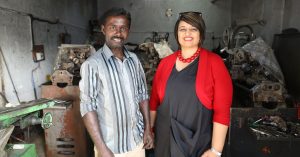Startup’s Filtration System Makes Water From Sewage Treatment Plants Fit For Drinking
Boson Whitewater is a Bengaluru-based water utility startup founded by Vikas Brahmavar. It converts treated wastewater (STP Water) into high-quality potable water by employing artificial intelligence (AI) and the internet of things (IoT).
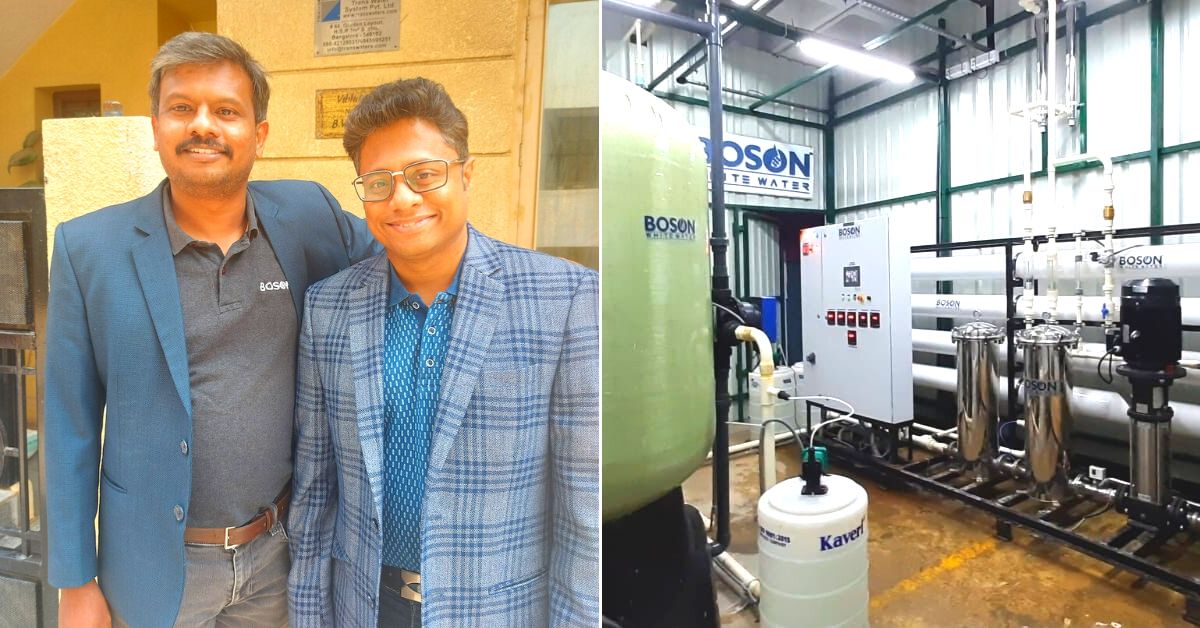
Vikas Brahmavar, a native of Bengaluru, remembers his days working in London before moving back to his hometown in 2008. On office days in London, during his lunch break, Vikas would take a walk on Tower Bridge, one of the city’s most famous landmarks.
“While walking on the bridge, I was surprised to notice that there was absolutely no smell emanating from the River Thames. It was a stark contrast to our lakes in Bengaluru. At the back of my mind, I always had this urge to come back home and do something in and around water infrastructure,” recalls Vikas, an engineer, in a conversation with The Better India.
Upon moving back to Bengaluru, he decided to work towards building a sustainable wastewater infrastructure for Indian cities. Establishing Trans Water System, a water treatment venture, in 2011, he focused on non-chemical water treatment in the initial years. In 2014, he took it up a notch and sought to create a larger impact by focusing on recovering wastewater.
“We realised there are many people who are working on sewage treatment plants (STP). However, the intention of setting up an STP was to meet government norms and not to save water. We did a survey for about 200 apartments and found that only 20% of STP (sewage treatment plant) treated water is reused for garden and flushing purposes,” explains Vikas.
“The remaining is sent to the drain. This is because there is no avenue to use the excess water. This is a common problem in Indian cities. For a country that faces severe water shortage every year, wastewater holds great potential to address water scarcity in our cities,” he adds.
He also realised that massive volumes of water get completely wasted and this is one of the primary reasons behind the pollution of Bengaluru’s lakes, excessive borewell exploitation and water scarcity. Developed cities in other parts of the world plan their water management based on the wastewater going out of the city as it’s more predictable.
“They don’t depend on rain to manage their water requirements. In Indian cities, we depend entirely on rainwater for our water requirements. We wanted to change this infrastructure and focus on recovering potable water from wastewater. This is the only way in which our cities can cater to the growing demand for water and become more sustainable,” says Vikas.
In 2019, under the aegis of Trans Water System, Vikas and his friend Gowthaman Desingh, a software engineer, introduced Boson Whitewater system that converts treated wastewater (STP water) into “high-quality potable water”. The setup has advanced an IoT (Internet of Things) and AI (artificial intelligence) enabled 11-step filtration system to reduce the various physical, chemical and biological contaminants present in treated wastewater.
“Boson Whitewater (BWW) was introduced to supply the highest quality water produced from wastewater. It was introduced in 2019 after a few years of research, product development and practical implementation on sites to make the product economically viable. Currently, we work with industries, IT parks, malls and apartment communities in Bengaluru and more recently in Hyderabad, and recycle their wastewater. We are focused on creating a circular economy in decentralised wastewater recovery and reuse,” says Vikas.
At the end of their 11-step filtration process, Vikas claims that the water does not have any contaminants. “E Coli, coliforms, heavy metals, high hardness, pesticides, herbicides are all removed and the water is crystal clear and potable,” he claims.
“National Accreditation Board for Testing and Calibration Laboratories (NABL) certified lab reports indicate the water is drinkable. Our IoT platform collects various parameters at every stage of filtration and uses AI algorithms to detect the various anomalies like filtration efficiencies, variation in the life of filters and pump failures,” he adds.
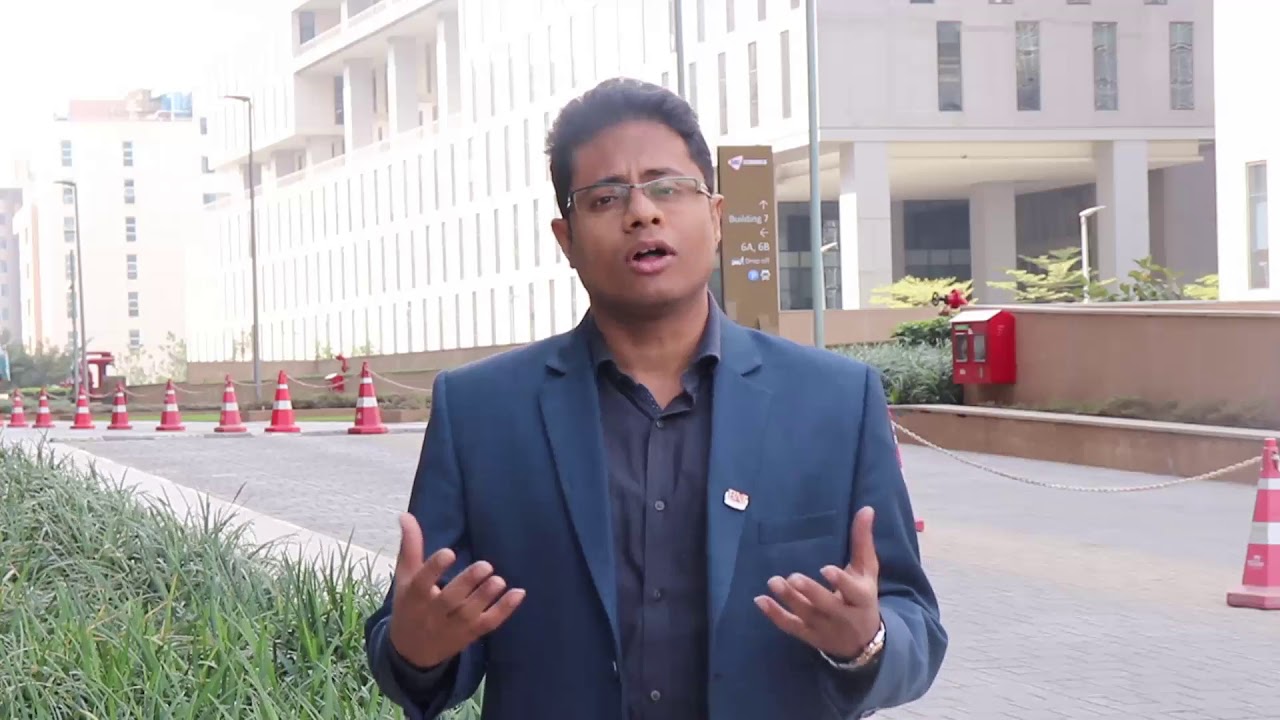
11 steps to clean water
In the first four stages of BWW’s 11-stage system, treated wastewater is taken through various filtration systems to reduce the turbidity, odour and iron present in the water using their “unique filters”. Usually, people use various types of sand media (a type of filter) for turbidity reduction. But normal sand media fouls (when contaminants collect on the surface or in the pores of a filtration membrane) for organics and needs replacement every six months.
“We use a specialised aluminosilicate material produced using crushed glass material and it does not foul, gives 80% better turbidity reduction and needs replacement only after 5-6 years. For iron reduction, we use a manganese dioxide-based ore which absorbs the iron. Without any chemicals we can reduce the iron level from 1.5 ppm (parts per million) levels to less than 0.3 ppm levels,” claims Vikas.
For those who don’t know, iron can cause turbidity, a foul odour which can lead to a variety of health problems if it is found in high concentration in water.
“The other two stages are media filters using clinoptilolite materials for TSS (total suspended solids) reduction which is again a type of ore which does filtration down to 5 microns. We achieve a very high reduction in TSS. All these stages are very unique and make the whole proposition viable for the organisation. We also use specialised impregnated carbon which has higher TOC (total organic contaminants) removal and we use this for odour reduction,” says Gowthaman.
In the next 2 stages, BWW uses different types of dosing systems to reduce the organic contaminants present in the water, followed by different levels of micron filtration systems.
“The dosing systems are normal pumps designed to dose about 6 litres of oxidation agent per hour. The oxidation agent we use ensures a drastic reduction of BOD (biological oxygen demand). Unlike conventional chlorine dosing which would have chloramine issues, we have organic dosing material which is effective and adds better value than conventional disinfection methods. We use cartridges which achieve 1-micron filtration levels with physical filtration,” explains Vikas.
Low BOD indicates that the water is less polluted by organic matter.
After this stage, the wastewater is taken through the Boson high recovery, low fouling membrane system which is designed to remove viruses and dissolved salts present.
“Boson High recovery system filters particles down to 0.001 microns. The viruses are generally in the 0.1-0.01 micron range and easily get filtered. The size of most dissolved particles is in the range of 0.01- 0.001 and therefore even most salts and heavy metals ions get filtered with membrane filtration. Unlike conventional membrane which rejects/wastes lots of water, we recover more than 75% of water in the first cycle and the remaining 25% is given back to the input cycle with efficient water balance, pH neutralisation and dilution. This makes the Boson system the highest recovery system and most viable commercially in India,” claims Gowthaman.
Post filtration, any residual bacteria and viruses present in the water are removed using an ultraviolet (UV) disinfectant system. For additional safety, and when external water is mixed with the treated water, BWW employs a SS 304 housing-based high-contact UV disinfection system. These UV systems pass 254 nm (nanometre) rays to disinfect the water.
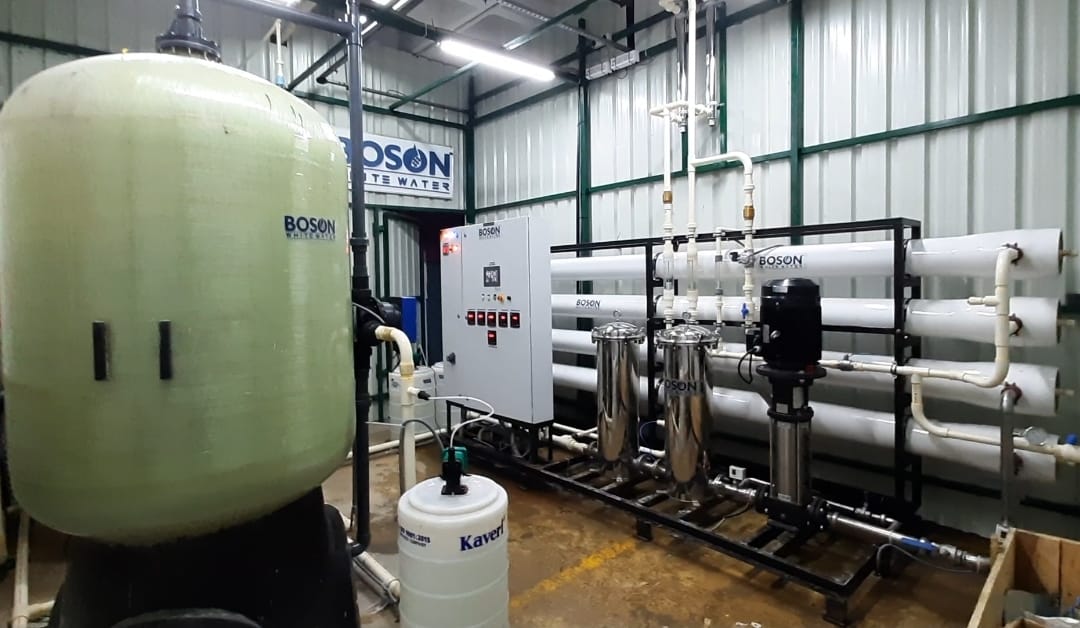
Deploying AI, IoT and selling potable water
The BOSON IoT platform is an integrated platform to collect the various system parameters, water quality and quantity from the BWW system.
“It is designed to collect the various system parameters like pressure at different stages and water quality parameters to measure the system efficiency which helps us in running the system with lesser downtime. The startup operates a fully automated system where no manpower is deployed to operate and maintain the system. Through our IoT platform we get real-time updates that help us in managing the system remotely,” explains Vikas.
The BOSON IoT platform collects various parameters at every stage of filtration and uses AI algorithms to detect various anomalies like filtration efficiencies, variations in the life of filters and pump failures. These datasets help them in managing their inventories and manpower better.
Going further, every water treatment system needs many components to make it fully integrated and functional. Few core components like membranes are imported and few ores are available locally from various Indian cities. The challenge is to assemble everything, make it all work together and complement each other and chemically satisfy the water characteristics.
“The BWW system is currently designed from 30,000 litres per day to 4,00,000 litres per day. Based on the requirement it can be designed and supplied for any required volume. For one of the largest malls, we are recovering about 1,50,000 litres of water per day,” claims Vikas.
Boson Whitewater is currently being sold on the ‘Opex model’, where the system is installed and maintained by Boson and water is sold to customers on a per litre basis. It’s common for apartment complexes, IT parks and malls with centralised air conditioning to buy water in tankers, which is then treated on-site and employed in cooling towers. Under the BWW model, these customers only have to pay for recycled water which costs less than tanker water. Installation and operational costs are absorbed by BWW. This business model helps IT parks, malls and apartment complexes significantly reduce their dependence on tanker water.
“The cost of Whitewater is between 8 to 10 paise per litre on average, however, it can go to 14 paise depending on the type of contaminants in the water. The cost of installing a 100 kilolitre system costs us approximately Rs 35-37 lakh. BWW is currently capped at a minimum volume of 30,000 litres per day as the economics is not viable for lower volume, hence we are focusing largely on Bulk wastewater generators. Eventually, there will be a day we will have systems viable for the domestic residential segment,” he notes.
Vikas also emphasises that at present apartments don’t use the treated water for drinking purposes primarily because of a “perception issue”.
“When we use the term ‘recycled water’, most people never think of potability reuse. They always assume that recycled water is purely for secondary use. The water is clean and can be used for all purposes, including drinking. Currently, the excess water is being sent to nearby industries and malls for all their internal use,” he says.
Shameer Abdul Rasheed, a resident of SJR Verity apartment complex in Bengaluru, tells The Better India how BWW set up their system earlier this year in March 2022.
“On a per-day basis, their system treats 70,000 litres of wastewater. We use the treated water for gardening and other purposes. But instead of wasting the excess treated water, it is put through additional purification and sent out to laundry services, hospitals and other industries nearby. These entities no longer have to purchase freshwater or extract further groundwater for their cooling systems or other purposes, but instead, use the potable water generated by BWW’s system. BWW uses our space, for which they pay us a certain amount each month, electricity (which they reimburse) and they sell the purified water,” says Shameer.
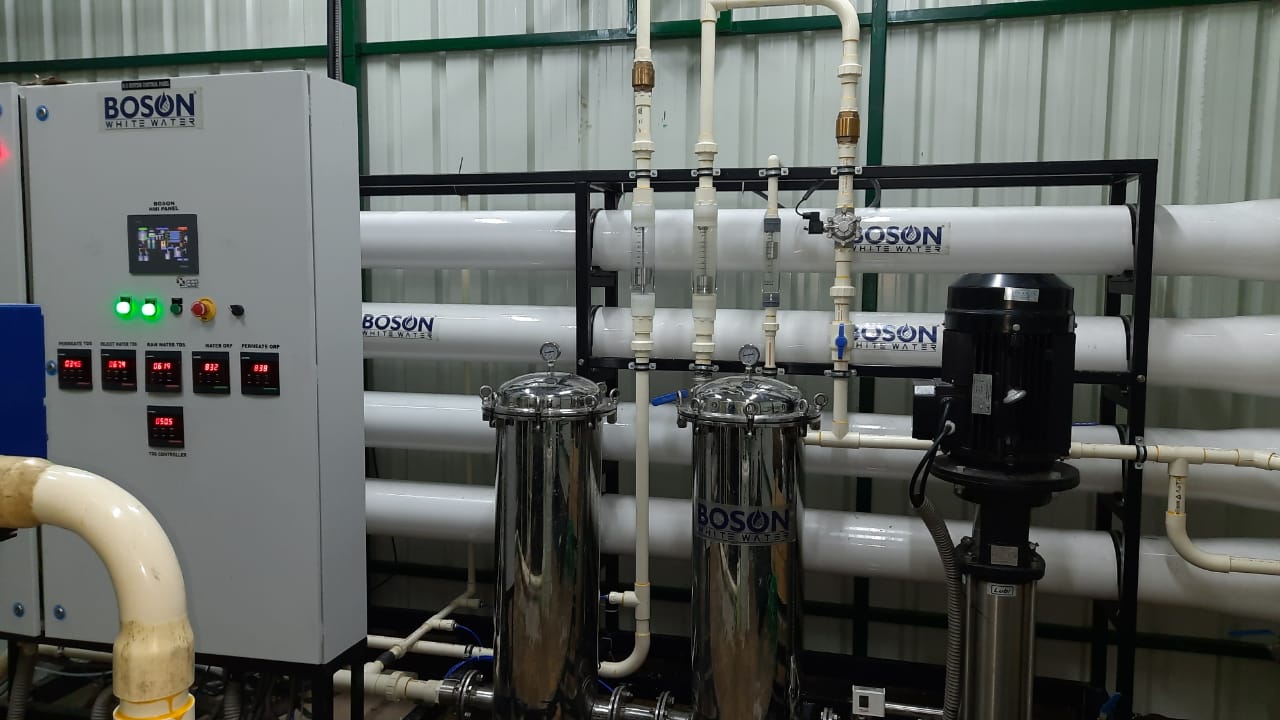
The startup has recently raised $419,000 (Rs 3.45 crore) in funding from the Indian Angel Network, a group of primarily Indian angel investors funding early-stage startups.
Boson Whitewater was also recently selected for ‘India Water Pitch-Pilot-Scale Start-Up Challenge’ by the Ministry of Housing & Urban Affairs (MoHUA). The venture is one among the 76 startups selected for the challenge from across India to work in the field of water supply, used water management, water body rejuvenation and ground water management.
“Looking ahead, we want to establish our Boson Whitewater system at 10 more large apartments in this financial year, save additionally about 50 crore litres of water and set up similar systems in IT parks and malls. We have recently launched operations in Hyderabad. By the next financial year, we will expand to Chennai. Over the next few years with our collaboration and partnership with various citizen forums and industries we should reach 500 crore litres of water created from treated wastewater,” says Vikas.
(Edited by Yoshita Rao)
(Images above courtesy Boson Whitewater. Feature Image with Vikas Brahmavar and Gowthaman Desingh)
This story made me
- 97
- 121
- 89
- 167
Tell Us More
We bring stories straight from the heart of India, to inspire millions and create a wave of impact. Our positive movement is growing bigger everyday, and we would love for you to join it.
Please contribute whatever you can, every little penny helps our team in bringing you more stories that support dreams and spread hope.







